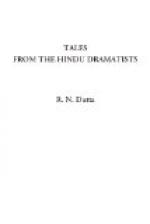An ambassador from Ravana comes and offers to give up Sita for the battle-axe of Parasurama, but this, Rama replies, must be reserved for Indra. On this refusal, Ravana goes forth after a brief dialogue with his queen Mandodari, who animates his drooping courage with the true spirit of the tribe to which she belongs.
“Banish your sorrow, lord of Lanka, take one long and last embrace. We meet no more. Or give command, and by your side I march fearless to fight, for I too am a Kshatriya.” The progress of Ravana through the air appals all Nature. The winds breathe low in timid murmurs through the rustling woods; the sun with slackened fires gleams pale abroad and the streams, relaxing from their rapid course, slowly creep along. Ravana defies Rama with great disdain and in derision of his modest demeanour, asks him whether he is not overcome with shame by the recollection of his ancestor, Anaranya, killed formerly by Ravana.
Rama replies:—
“I am not ashamed my noble ancestor fell in the combat. The warrior seeks victory or death, and death is not disgrace. It ill befits thee to revile his fame. When vanquished, thou couldst drag out an abject life in great Haihaya’s dungeons, till thy sire begged thee to freedom, as a matter of charity. For thee alone I blush, unworthy of my triumph.”
Ravana falls under the arrows of Rama. The heads, that once, sustained on Siva’s breast, shone with heavenly splendour, now lie beneath the vulture’s talons. Mandodari bewails the death of her husband. Sita is recovered, but Rama is rather shy of his bride, until her purity is established by her passing through the fiery ordeal: a test she successfully undergoes. Rama returns with Sita and his friends to Ayodhya, when Angada challenges them all to fight him, as it is now time to revenge his father’s death. A voice from heaven, however, tells him to be pacified, as Bali will be born as hunter in a future age, and kill Rama, who will then be Krishna: he is accordingly appeased. Rama is now seated on the throne of Ayodhya. After some time, he orders the exile of Sita.
ANERGHA RAGHAVA OR MURARI NATAKA.
The sage Viswamitra comes to Dasaratha, the king of Ayodhya, to request the aid of his eldest son Rama. Each tries to outdo the other in complimentary speeches. The sage observes:—
“The monarch of the day invests the dawn with delegated rays to scatter night, and ocean sends his ministers the clouds, to shed his waters over the widespread earth.”
The king, taking counsel with himself, and being reminded by Vamadeva, one of his priests and preceptors, that the race of Raghu never sent away a petitioner ungratified, sends for Rama and Lakshmana, and allows Viswamitra to take them with him, to his hermitage, situated on the banks of the Kausiki or Coosy river, to protect him in his rites against the oppression of Taraka, a Rakshasi.




